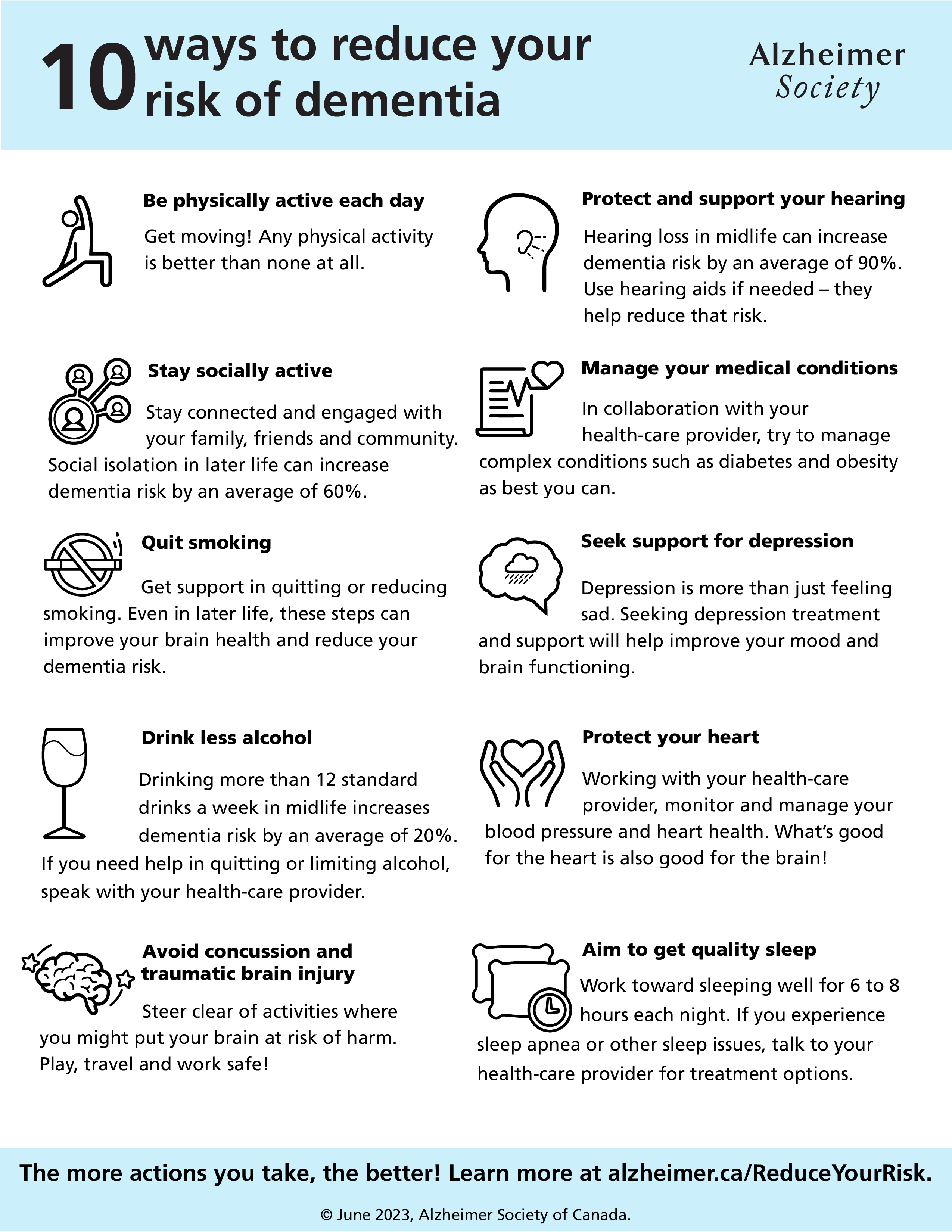[Resource] 10 ways to reduce your risk of dementia

10 ways to reduce your risk of dementia
While some dementia risk factors, like age and genetics, can't be changed, you can take action to reduThe number of people diagnosed and living with dementia in Canada is rising. By the year 2050, more than 1.7 million people are expected to be living with dementia in our country. But there is hope!
Together, we can take action to reduce our own dementia risk.
While some risk factors for dementia can’t be changed – like genetics and age- there are many ways you can take action on to reduce your overall risk at any time of life.
The more actions you take, the better! And if you can’t improve on one factor here, work on improving others – there's always a chance to take action and reduce your risk in one way or another.
The Alzheimer Society recommends these 10 evidence-based ways to reduce your risk of developing dementia

Be physically active each day
Get moving! Walk, roll, jog, dance, swim, bike, garden or do chores or yard work. Any physical activity is better than none at all.
![]()
Protect, check and support your hearing
Hearing loss in midlife can increase dementia risk by an average of 90%. Use hearing aids if needed – they help reduce that risk. Protect your hearing from loud noises. Get your hearing tested.

Stay socially active
Stay connected and engaged with your family, friends and community. Virtual visits and activities count, too! Social isolation in later life can increase dementia risk by an average of 60%.

Manage your medical conditions and learn more about them
In collaboration with your health-care provider, try to manage complex conditions such as diabetes and obesity as best you can. These two conditions in particular can increase dementia risk, among others.
![]()
Quit smoking
Quitting or reducing smoking, even in later life, can improve your brain health and reduce your dementia risk. Ask your health-care team for support!
![]()
Seek support for depression
Depression is more than just feeling sad. Seeking depression treatment and support will help improve your mood and brain functioning, as well as allowing you to take action on other risk factors.
![]()
Drink less alcohol
Research shows that drinking more than 12 standard drinks a week in midlife increases dementia risk by an average of 20%. Try out the growing number of mocktail and alcohol-free drink options instead! And if you need help with limiting alcohol, speak with your health-care provider.

Protect your heart
Working with your health-care provider, monitor and manage your blood pressure and heart health. What’s good for the heart is also good for the brain!

Avoid concussion and traumatic brain injury
Steer clear of activities where you might put your brain at risk of harm. Follow traffic rules and pedestrian signals. Be aware of your surroundings. Play, travel and work safe!
![]()
Aim to get quality sleep
Work toward sleeping well for 6 to 8 hours each night. If you experience sleep apnea or other sleep issues, talk to your health-care provider for treatment options.
10 ways to reduce your risk of dementia poster
Read about the 10 ways to reduce your risk of dementia in our downloadable poster.
Download a print-friendly version of the PDF for professional print-use.
Check out the resources below to learn more about more risk reduction recommendation and strategies.
ce your risk of developing Alzheimer’s disease and other dementias, with these tips!
-
By
Alzheimer Society
-
Published
Jan 10, 2024
-
Subject Area
- Health & Wellness - General
- Health & Wellness - Cognitive & Mental
-
Audience
- Service Providers (Non-profits, Community Organizations, Local government)
- Caregivers, Seniors & Volunteers
-
Category
- Best Practices
Newsletter
Sign up for the Healthy Aging CORE Alberta e-news to keep up-to-date with activity from the platform and the Community-Based Seniors Services (CBSS) sector across the province.

